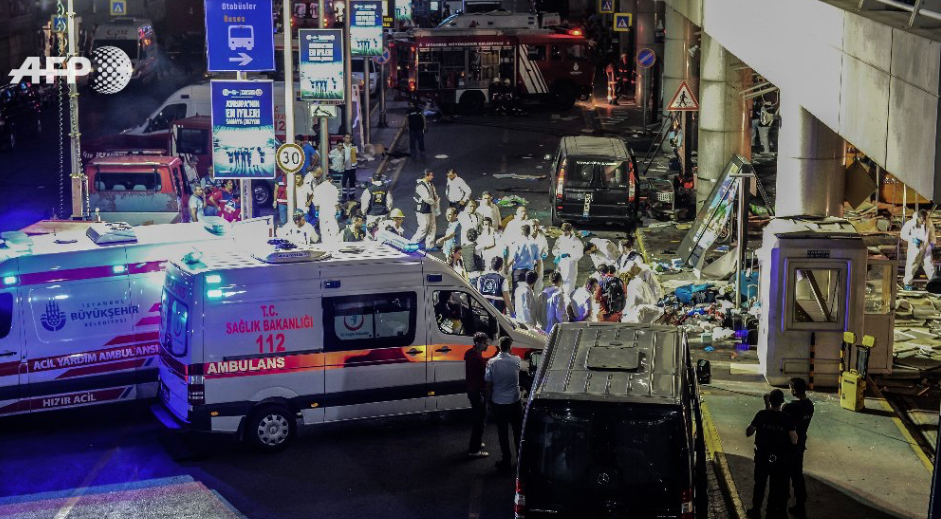Suicide Attackers Kill 41, Injure Hundreds in Turkey
29 Jun, 2016
Suicide attackers armed with guns and bombs killed 41 people and wounded scores of others at Istanbul’s busy Ataturk Airport in an attack the government blamed on Islamic State extremists.
Funerals were expected Wednesday for some of the victims – who included at least 23 Turkish citizens and 13 foreign nationals – as Turkish authorities tried to piece together how the attack happened.
A Turkish official said authorities are going through surveillance footage and interviewing witnesses to establish a preliminary timeline and details.
The death toll excluded the three bombers, who arrived in a taxi and eventually blew themselves up after coming under fire, according to the government, though there were conflicting reports about exactly where they detonated their explosives.
Suicide attackers armed with guns and bombs killed 41 people and wounded scores of others at Istanbul’s busy Ataturk Airport in an attack the government blamed on Islamic State extremists.
Funerals were expected Wednesday for some of the victims – who included at least 23 Turkish citizens and 13 foreign nationals – as Turkish authorities tried to piece together how the attack happened.
A Turkish official said authorities are going through surveillance footage and interviewing witnesses to establish a preliminary timeline and details.
The death toll excluded the three bombers, who arrived in a taxi and eventually blew themselves up after coming under fire, according to the government, though there were conflicting reports about exactly where they detonated their explosives.
As dawn broke over the destroyed terminal, workers began removing debris. An information board inside showed about one-third of scheduled flights were canceled, and a host of others were delayed.
Earlier, the hundreds of passengers who fled the airport in fear were left sitting on the grass outside. Several ambulances drove back and forth, and security vehicles surrounded the scene.
The Istanbul governor’s office said more than 230 people were wounded.
Turkish Prime Minister Binali Yildirim said it appeared that the Islamic State group, which has threatened Turkey repeatedly, was responsible.
“Even though the indications suggest Daesh, our investigations are continuing,” Yildirim said, using Arabic shorthand for Islamic State.
Turkey has suffered a series of attacks, and the increasing frequency and scale have scared away visitors and devastated the economy, which relies heavily on tourism. The country is a key partner in the U.S.-led coalition against Islamic State and a NATO member.
Turkey shares long, porous borders with Syria and Iraq, war-torn countries where IS controls large pockets of territory. Authorities have blamed IS for several major bombings over the past year, including on the capital Ankara, as well as attacks on tourists in Istanbul.
The government has stepped up controls at airports and land borders and deported thousands of foreign fighters, but has struggled to tackle the extremist threat while also conducting security operations against Kurdish rebels, who have also been blamed for some recent deadly attacks.
The devastation at Istanbul’s airport follows the March attack on the Brussels airport, where two suicide bombings ripped through check-in counters, killing 16 people. The Islamic State group claimed responsibility for that attack, as well as a subsequent explosion at a Brussels subway station that killed 16 more people.
Belgian Prime Minister Charles Michel said on Twitter: “Our thoughts are with the victims of the attacks at Istanbul’s airport. We condemn these atrocious acts of violence.”
Turkish airports have security checks at both the entrance of terminal buildings and then later before entry to departure gates.
The prime minister called for national unity and “global cooperation” in combatting terrorism.
“This (attack) has shown once again that terrorism is a global threat,” Yildirim said. “This is a heinous planned attack that targeted innocent people.”
He suggested that the attack was linked to what he said was Turkey’s success against Kurdish rebels, as well as steps Ankara took Monday toward mending strained ties with Israel and Russia.
Yildirim said there were no immediate indications that other attackers were at large.
On Jan. 12, an attack that Turkish authorities blamed on IS claimed the lives of a dozen German tourists visiting Istanbul’s historic sites. On March 19, a suicide bombing rocked Istanbul’s main pedestrian street, killing five people, including the bomber, whom the authorities identified as a Turkish national linked to IS.
Last October, twin suicide bombings hit a peace rally outside Ankara’s train station, killing 102 people. There was no claim of responsibility but Turkish authorities blamed the attack on a local Islamic State cell.
Istanbul’s Ataturk Airport was the 11th busiest airport in the world last year, with 61.8 million passengers, according to Airports Council International. It is also one of the fastest-growing airports in the world, seeing 9.2 percent more passengers last year than in 2014.
AP
Image AFP
Mentioned In This Post:




















